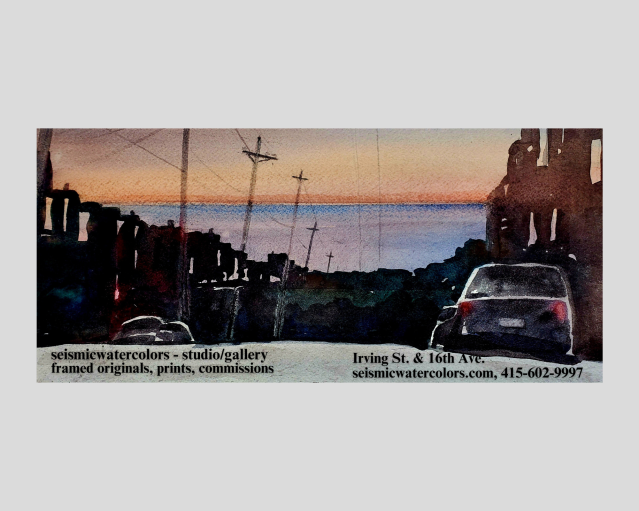Supervisor Katy Tang
Community Updates
Caltrans’ Sloat Boulevard Project Update
In April, Caldrons began repaving work on Sloat Boulevard, between Skyline
Boulevard and 19th Avenue, including upgrades to existing
curb ramps and pedestrian walkways, to ensure compliance with
the Americans with Disabilities Act (ADA).
Caltrans will also install four Pedestrian Hybrid Beacons, or
“HAWK” traffic beacons, on Sloat Boulevard, at 21st Avenue,
26th Avenue, Everglade Drive and 36th Avenue.
The signals are activated by pedestrians and turn solid red to signal motorists to
stop. This is followed by a blinking red light, which is treated as a stop sign.
Caltrans had initial plans to install a traffic signal at Sloat Boulevard and El Mirasol
Place, but revised the plan to include an additional HAWK beacon due to
neighborhood traffic and circulation concerns.
Caltrans will also install bulbouts to decrease crossing distances at four
locations on Sloat, at 21st Avenue, 26th Avenue, El Mirasol Place and 36th Avenue.
The size of the bulb-outs has been decreased due to community feedback,
which will preserve some parking while still providing enhanced pedestrian safety.
Based on public feedback, previous plans by the San Francisco Municipal
Transportation Agency (SFMTA) to relocate three of four bus zones
have been eliminated. Buses will continue to stop at their current locations, except at
El Mirasol Place-Middlefield Drive, where the eastbound bus zone will be
relocated from between the crosswalks at El Mirasol Place to just west of El
Mirasol Place. This is due to the installation of additional bulbouts, which can
no longer accommodate a bus stop.
Caltrans will also extend bicycle lanes on Sloat toward Skyline Boulevard, which will
remove on-street parking on some areas near the Taraval bridge crossing over Sunset
Boulevard.
For more information, please contact Robert Haus, Caldrans’ public information
branch chief, at (510) 286-5576 or Robert.Haus@dot.ca.gov. You can also find more
information at the websites at www.dot.ca.gov/d4/sloatresurfacing
or http://sfpublicworks.org/sloat.
Senior Tax Exemptions for SFUSD
The Quality Teacher Education Act (QTEA) of 2008 and the School Facilities
Special Tax of 2010 were passed by the voters of San Francisco to provide
critically-needed funds to the San Francisco Unified School District.
For the 2017-18 tax year, QTEA will levy a fee of $244.10 for each eligible parcel.
The School Facilities Special Tax will levy a fee of $36.78 for single-family dwellings,
condominiums and commercial properties, and $18.76 per unit for
apartments, flats and mixed-use dwellings. Both of these measures include an
exemption for seniors living on the property, provided they meet certain criteria.
In order for a parcel to be exempt from QTEA, the owner of the parcel must
occupy it as their primary residence and be 65 years of age or older as of
June 30, 2017. In order for a unit to be exempt from the School
Facilities Special Tax, the unit must be the primary residence of
an occupant (either owner or tenant) who will be 65 years or older
as of June 30, 2017.
To apply for this exemption, please complete an application form and
submit it by the deadline. Exemption applications must be submitted each year and
are not automatically renewed. No late application forms will be
accepted.
For more information and the application form, visit the website at
http://www.sfusd.edu/en/aboutsfusd/voter-initiatives/senior-citizen-exemption.
Organ Donation Awareness
Last month, I joined the San Francisco Department of Public Health (SFDPH),
San Francisco Health Service System (SFHSS), San Francisco Unified School
District (SFUSD) and Donor Network West, a federally designated
organ procurement organization, in spreading awareness about the importance of organ
donations. Out of the 119,000 people on the national transplant waiting list,
665 reside in San Francisco. Some 44 percent (291 patients) in San Francisco waiting for a
transplant are Asian, but there were only 77 Asian donors in all of California last year.
Every day in the U.S., 22 people die waiting for a transplant. These deaths
are preventable, and even though the waiting list for organs gets
longer every year, the number of donors and transplants does not
keep up with the growing need.
Living organ donors can also save a life by donating a portion
of their liver or one of their kidneys.
Charlie Paulson, who grew up in the Sunset District, is someone I know who is currently
waiting for a life-saving kidney transplant. He is the husband
to my legislative aide, Ashley Summers, and father to their
one-and-a-half-year-old daughter. Charlie is a student teacher at
A.P. Giannini Elementary School and will receive his teaching credential
this month. He may have to wait up to 10 years for a deceased
kidney donation, and meanwhile undergoes dialysis treatments.
A living donation is a powerful way to show humanity and save a life. People interested
in donating a kidney to Charlie can visit the website at
http://www.facebook.com/KidneyforCharlie and fill out the confidential
donor form at http://www.ucdonor.org, using his date of birth (7/15/82).
Anyone can become a potential organ or tissue donor regardless of age, ethnicity or
medical history. People can indicate that they would like to be an organ
donor as early as the age of 13 by filling out an online form at
the website at www.donateLIFEcalifornia.org or by indicating they would like
to become a donor during their driver’s license application or renewal process.
It is important for people to talk about organ donation with
their friends and families and to arm themselves with facts. San Francisco has taken the
lead by providing education to primary care physicians in our SFDPH
clinics and also by beginning to implement organ and tissue donation
education in our public high schools.
Katy Tang represents District 4 on the SF Board of Supervisors and can be
reached at (415) 554-7460 or Katy.Tang@sfgov.org.
Categories: board of supervisors, City Hall, Health, Katy Tang, Sunset Beacon, Sunset District, Traffic










